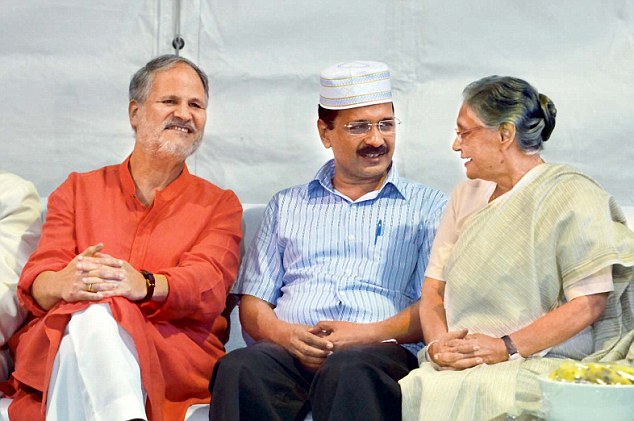Who Is Responsible For the Crisis Of Government in Delhi?

PUNE: The Crisis of Governance in Delhi has been in the news for the entire week with most channels making the Aam Aadmi Party the sole target of their vitriolic attack. It is ironical that the crisis has hit the national capital of India which has six BJP MPs, three municipal corporations controlled by the BJP, an omnipotent Lt Governor “henchman” of the BJP, and then there is the hapless AAP state government that cannot purchase a pencil without getting permission from the LG.
But, what has really been the genesis of this crisis and how much is the AAP responsible for it ? Let turn to history to place the crisis in the right context.
Since the early days, the debate about the political status of Delhi has been more of political one-upmanship between the Congress party and the BJP. Each party promised the electorate full statehood for Delhi. In 1991, the then Congress Government at the centre introduced a bill to offer Delhi a National Capital Territory status with an elected legislature and a Chief Minister thrown in, to give it a flavour of statehood. However, the bill excluded from the CM’s executive powers three areas namely Land, Law and Order and Public Order which were kept with the Centre through the Office of the LG.
In fact, now there is sufficient ground to say that, there has always been collusion between the BJP and the Congress to retain hold over the “golden goose” that the city was being projected as in 1991. With impending globalization, the capital was going to be a busy hub with growing commercial and diplomatic activities, and consequent rising land prices.
However, the argument forwarded for this hybrid power structure was an entirely innocent one. That Delhi being host to people from other states, diplomats, trade representatives, lobbyists et al required the Centre to regulate the quality of civic amenities, as well as law and order. It was clear fairly soon that the centre’s concern began with and ended in Lutyens Delhi and a couple of posh localities of South Delhi. Both the Congress and BJP were least interested in the vast hinterland of Jhuggi Jhopri (commonly known as J-J) slum colonies, populated by refugees from the countryside. Except for the five yearly interest for their votes. No wonder the LG who is in charge of law and order remains insolent, despite there being a rape every four hours and a case of molestation every two hours in Delhi that is now even referred to as the ‘rape capital of India’. The Police department under him has a rate of rape case conviction of only 17% as against the national benchmark of 28%.
In 1991, when the Centre awarded Delhi an elected legislature and Chief Minister it was implicit that the CM as the elected representative had executive powers on all subjects except the three stated above. And the Lt Governor like any Governor of a state should act on the“aid and advice” of the elected CM. Contrary to this democratic convention, as of today, all the bills passed by the Delhi legislature are pending with the LG to be cleared at his pace and pleasure. And somehow his pleasure has become increasingly slow in dealing with issues of import.
On May 21, 2015, a note made it clear that ‘services’ in the Delhi government fall within the purview of the LG and hence the central government. The Delhi High Court set aside the AAP appealagainst this MHA notification. The LG followed with a memorandum to all secretaries of the Delhi government, declaring himself as “the competent authority” and directing that “no order in future be issued without his approval.” He also asked officers to review all decisions taken since the Aam Aadmi Party came to power and send him all files for which his approval was not made. The final decision would, of course, rest with him.
With this background, for a while set aside the dumbing down narrative of Prime time TV Media. Father of the Indian constitution Dr.B.R.Ambedkar, during a debate in the Constituent Assembly had stated that “Democracy in India is only a top dressing on the Indian soil which is essentially undemocratic”.
Dr. Ambedkar was apprehensive of the sustenance of Democratic character of the Indian Constitution. He tried to make the Indian Constitutions as comprehensive as possible. However, it is impossible to foresee all exigencies likely to be posed by ever dynamic future. Hence like all other Constitutions, he expected the Indian constitution be treated as a set of guidelines and broad governing principles.
Delhi’s present “quasi-state” status is an “operational arrangement” to address the specific character of Delhi as capital. BJP at the center has vitiated the democratic essence of our Constitution when it contrived a situation in which a publicly elected head of government had to seek approvals for his decisions from an appointed administrative authority.
Prime time TV media never even once made an attempt to expand the coverage of the story into this holistic narrative. It’s constant AAP bashing only shows its poor understanding of the complexities involved. As a Latin legal maxim states: ‘no one can correctly understand a part until he has read the whole’



